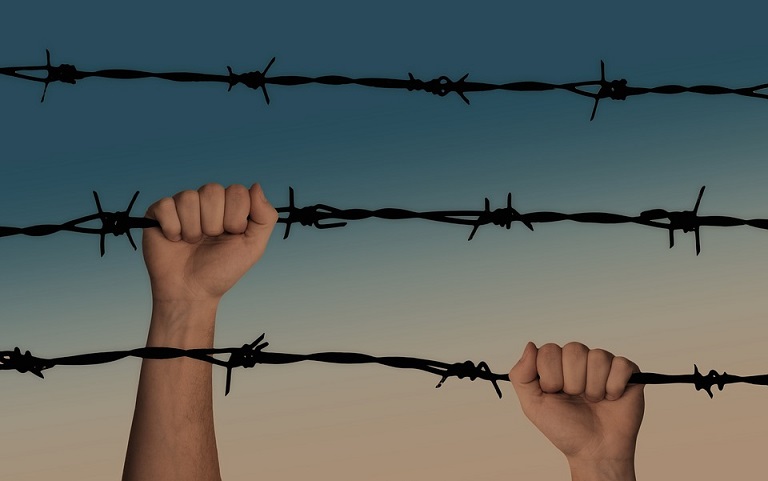The Helen Bamber Foundation (HBF) and Humans for Rights Network (HFRN) have gathered first-hand evidence that the government’s use of RAF Wethersfield airfield as a large ‘open-prison camp’ for refugee men seeking asylum for the last five months has already caused irreparable and profound harm to the residents.
Some people have tried to take their own lives – with several people attempting to burn themselves to death.
Wethersfield: ‘no different to Libya’
HBF’s clinicians have carried out 10 detailed assessments and HFRN has conducted casework with over 140 individuals since the camp opened in July 2023, and have found that the men have displayed symptoms of worsening mental health following transfer to Wethersfield, including low mood, loneliness, flashbacks, reduced appetite, weight loss, feelings of despair and difficulty sleeping, and a worsening in symptoms of post-traumatic stress disorder.
Men held there have reported anxiety and depression, suicidal ideation, intense desperation and fear, self-harm, and acute sleep deprivation. When one man shared his suicidal thoughts with members of staff at the site, he was simply told that it was “normal in this environment”.
 Nasser, who like many of the men held in Wethersfield travelling through Libya when fleeing his country, said: “The hardest part for me after what I have been through in Libya, is what I am going through now in Wethersfield. People screaming at night, gunshots can be heard. When someone wakes up screaming, I don’t know what to do. I came through Libya this place is no different”.
Nasser, who like many of the men held in Wethersfield travelling through Libya when fleeing his country, said: “The hardest part for me after what I have been through in Libya, is what I am going through now in Wethersfield. People screaming at night, gunshots can be heard. When someone wakes up screaming, I don’t know what to do. I came through Libya this place is no different”.
Salman, who came from Iran, said: “I have attempted suicide personally because of the conditions of the camp. Once I tried to hang myself and once there was a group of us six or seven people tried to set ourselves on fire, they didn’t let us in the camp and extinguished the fire, I had a part of my T-shirt burnt, many others as well, it has affected our mental health in a very bad way… We were told you only stay for two weeks here; it was a lie; it’s been two months nothing happened”.
Unlawful detentions?
By the end of October 2023, 508 men had been placed in Wethersfield – the top countries of origin being Afghanistan (29%), Iran (20%) and Eritrea (16%). Many of them are survivors of torture and trafficking and those with severe mental health issues.
 This is despite Home Office guidance making clear that these groups should not be placed there – in the first three months of being open, a quarter of residents were moved out of Wethersfield because they did not meet the camp’s ‘suitability criteria’ and had unlawfully been placed there. At least 11 children wrongly assessed to be adults have been identified in the camp.
This is despite Home Office guidance making clear that these groups should not be placed there – in the first three months of being open, a quarter of residents were moved out of Wethersfield because they did not meet the camp’s ‘suitability criteria’ and had unlawfully been placed there. At least 11 children wrongly assessed to be adults have been identified in the camp.
The camp is extremely isolated, has overcrowded living conditions, and lacks the necessary healthcare provision, causing additional pain and trauma to people who have already endured conflict, oppression, abuse, torture and trafficking. The camp’s resemblance to a prison, with barbed wire and surveillance, triggers traumatic experiences among residents, many of whom have had experiences of other ‘camps’, in Egypt and Libya for example.
Wethersfield was initially proposed as a temporary site for 12 months, but the Home Office intends to extend the use of the site for a further three years. This would be a terrible development and the Home Secretary should instead act urgently on his recent commitment to close the site.
 Wethersfield: nothing more than a prison
Wethersfield: nothing more than a prison
Maddie Harris, Director of Humans for Rights Network, said: “The most commonly used word by the men held in Wethersfield when describing their experience there is ‘prison’. The camp’s isolated setting, cutting these men off not only from their own communities but from society as a whole is causing profound distress and re-traumatisation amongst all those we have spoken to.
By placing men in Wethersfield, this government is ghettoising people seeking asylum in the UK, preventing them from accessing justice and other vital entitlements such as adequate medical care. This government has a legal obligation to provide them with safe, secure accommodation. Wethersfield is unsafe, for both the mental and physical health of the men held there and must be closed with immediate effect as. It is our belief that it is only a matter of time before someone dies in Wethersfield.”
Kamena Dorling, Director of Policy at the Helen Bamber Foundation, said: “The government claims that these horrific camps on former military sites are necessary to manage the record number of people arriving in the UK to seek asylum. But the real problem is the Home Office failure to efficiently process asylum claims in time, which would allow those who have been granted refugee status to move on and live independently.
 Instead, hundreds of thousands of people seeking asylum are stuck in an ever-growing asylum backlog, dependent on Home Office temporary accommodation and financial support. The answer to that problem is not the creation of asylum camps that clearly and deliberately cause people seeking protection additional suffering and harm.”
Instead, hundreds of thousands of people seeking asylum are stuck in an ever-growing asylum backlog, dependent on Home Office temporary accommodation and financial support. The answer to that problem is not the creation of asylum camps that clearly and deliberately cause people seeking protection additional suffering and harm.”
*Article originally published in The Canary.
(Photos: Pixabay)












.jpg)












